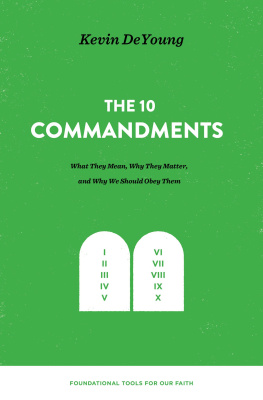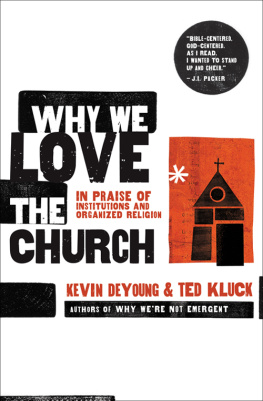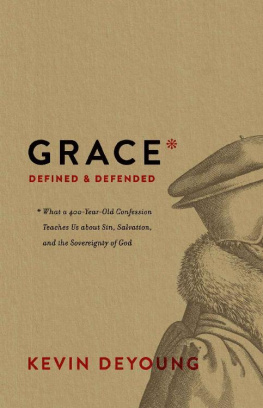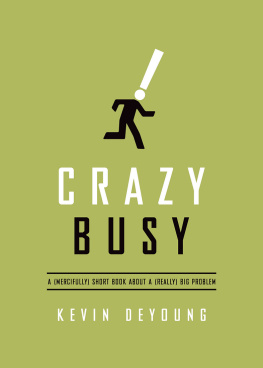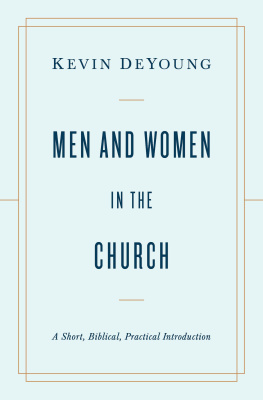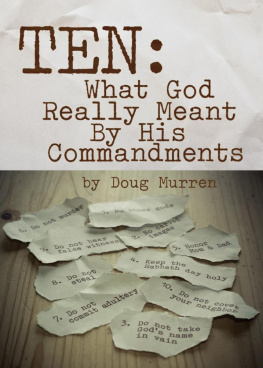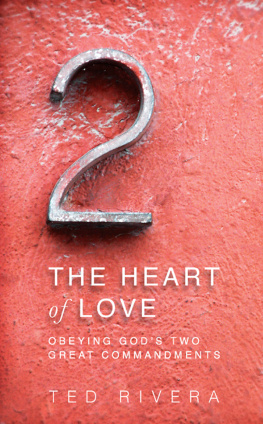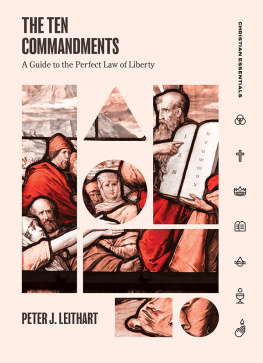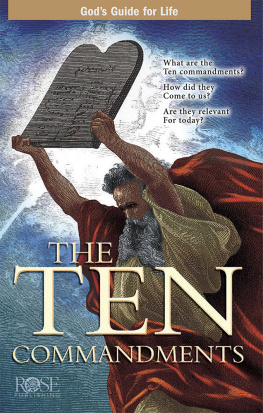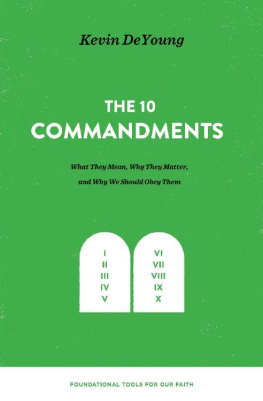Table of Contents
Landmarks
Remember the Sabbath day, to keep it holy. Six days you shall labor, and do all your work, but the seventh day is a Sabbath to the Lord your God. On it you shall not do any work, you, or your son, or your daughter, your male servant, or your female servant, or your livestock, or the sojourner who is within your gates. For in six days the Lord made heaven and earth, the sea, and all that is in them, and rested on the seventh day. Therefore the Lord blessed the Sabbath day and made it holy.
Exodus 20:811
The fourth commandment can be confusing.
Every one of the Ten Commandments is still binding, and every one has been deepened and transformed by the coming of Christ, this commandment more noticeably than the others. This is why Christians have not always agreed on how to obey the fourth commandment, or on whether the commandment needs to be kept at all.
Even within the Reformed tradition there are different understandings of what it means to observe the Sabbath, or honor the Lords Day, or if these two expressions, Sabbath and Lords Day, mean the same thing. Heres what the Westminster Confession of Faith says:
[God] hath particularly appointed one day in seven, for a Sabbath, to be kept holy unto him: which, from the beginning of the world to the resurrection of Christ, was the last day of the week; and, from the resurrection of Christ, was changed into the first day of the week, which, in Scripture, is called the Lords Day, and is to be continued to the end of the world, as the Christian Sabbath.
Later, the Westminster Confession says that the day is to be set aside from all worldly employments and recreations.
The Heidelberg Catechism hits on similar themes but with a different emphasis. The catechism asks, What is Gods will for you in the fourth commandment? The answer contains two parts:
First, that the gospel ministry and education for it be maintained, and that, especially on the festive day of rest, I diligently attend the assembly of Gods people to learn what Gods Word teaches, to participate in the sacraments, to pray to God publicly, and to bring Christian offerings for the poor.
Second, that every day of my life I rest from my evil ways, let the Lord work in me through his Spirit, and so begin in this life the eternal Sabbath.
The Heidelberg Catechism does less to stress the SabbathLords Day connection, choosing instead to focus on corporate worship and resting from evil deeds.
And then theres this from the twenty -f ourth chapter of the Second Helvetic Confession (1566), a document from the Swiss Reformation and one of the most popular and comprehensive statements of faith in the sixteenth century:
We see that in the ancient churches there were not only certain set hours in the week appointed for meetings, but that also the Lords Day itself, ever since the apostles time, was consecrated to religious exercises and to a holy rest; which also is now very well observed by our churches, for the worship of God and the increase of charity. Yet herein we give no place unto the Jewish observation of the day, or to any superstitions. For we do not account one day to be holier than another, nor think that mere rest is of itself acceptable to God. Besides, we do celebrate and keep the Lords Day, and not the
All three documents talk about rest and worship on the Lords Day. They all believe in the fourth commandment. But after that, there are some important differences. Is Sunday the Christian Sabbath? Or is it a festive day of rest? Or do we keep the Lords Day, not the Sabbath, and that with a free observation?
Confusing, but Critical
If the fourth commandment can be confusing and controversial, that doesnt mean its less important. In fact, you can make the case that the Israelites would have understood the fourth commandment to be the most important of the ten. For starters, it is the longest and most detailed commandment. Moreover, Sabbath observance is mentioned more often than any of the other Ten Commandmentseleven times in the Pentateuch and over one hundred times in the Old Testament. The Sabbath is the only other day in the Jewish calendar besides the Day of Atonement where all work is strictly prohibited, and the fourth commandment is the only one of the ten which the Lord clearly gave to the nation of Israel before they reached Mount Sinai (see Exodus 16). Even if we conclude that there are significant points of discontinuity between the Jewish Sabbath and the Christian Lords Day, we would be unwise to suggest that God is indifferent to the principles of rest and worship.
When people think of the fourth commandment, they quickly jump to practical questions of scrupulosity: Can I go out to eat on Sunday? Can I watch football on Sunday? Do I have to take a nap on Sunday? But those are not the questions we should start with (and maybe theyre not the questions we should end with either). Ill finish with three ways we can observe the fourth commandment. But first I want to provide a biblical overview of the Sabbath and try to sum up the moral principles inherent in Sabbath keeping.
The Sabbath in the Old Testament
Like so much theology, a proper understanding of the Sabbath begins in Genesis. We read in Geneis 2:3 that God blessed the seventh day and made it holy. The Sabbath principle, therefore, was not invented by Moses after the exodus. It can be argued that the Mosaic Sabbath is not identical to the creation Sabbath, but it cannot be denied that we see a Sabbath principle at work from the very beginning of the world.
Have you ever thought about where the week comes from? Days come from the earths rotation on its axis. Months are more or less gauged to the lunar cycle. The year is a result of the earths revolution around the sun. In other words, scientific phenomena have given us days, months, and years. But why weeks? A seven -d ay week seems arbitrary, relative to the natural rhythms of the solar system. The week is what it is because God made it that way. He accomplished his work in six days and then rested on the seventh. Every time and everywhere we cycle through Sunday -M onday -T uesday -W ednesday -T hursday -F riday -S aturday , we are embodying the Sabbath principles introduced into the world by God himself.
The church calendar is fundamentally a weekly calendar. I have no problem celebrating Good Friday, Easter, and Christmas. There are good historical and cultural reasons (along with gospel reasons) for highlighting these events each year. But the only calendar God gave to the church is the seven -d ay calendar that culminates in a day of worship and rest.
Exodus 20:8 calls us to remember the Sabbath day, suggesting that the Sabbath was not being called into existence at Mount Sinai. Remember is more than a mental word in the Bible. It means to recollect and put into practice. To remember the Sabbath day was to acknowledge the sabbath principle in creation and own it for yourself. Interestingly, the parallel account of the Ten Commandments in Deuteronomy 5 roots the Sabbath in Israels freedom from slavery. There it says, Remember that you were a slave in the land of Egypt (Deut. 5:15). The Sabbath, then, is grounded in both creation and redemption. It is a sign of Gods creative purposes and saving grace.The rest of the Old Testament helps us see how the fourth commandment took shape in ancient Israel. In Exodus 31 we see that the Sabbath became a sign of the Mosaic covenant. Just as a rainbow in the sky spoke of Gods promise to Noah, so the Sabbath was the sign that God would take care of his people if they learned to trust him. Trusting the Lord meant resting from business as usual on the Sabbath (Isaiah 58; Amos 8) and gathering for a sacred assembly (Lev. 23:3). These were the twin engines of the Sabbath: worship and rest. The two were inextricably linked in the Old Testament. We rest so that we might be free to worship God; and we give God worship, in part, by trusting him enough to rest.

